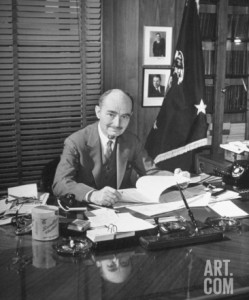When Francis Biddle became a senior U.S. Department of Justice official (first Solicitor General, then Attorney General) in the 1940s, he “ordered” top lawyers to start keeping diaries. He explained that diary-keeping would improve performance—having personal records would help everyone “later” when they needed to revisit topics and remember accurately, in detail, what things had happened, how and why. (Biddle also had an artistic, literary temperament and a strong sense of history; I suspect that he advocated writing not just for its value to management, but also because engaging in the writing craft can bring pleasure to the writer, and because writing lasts.)

Warner W. Gardner, a leading, great federal government lawyer in the 1930s and 1940s, including in Biddle’s DOJ, told me of Biddle’s edict. In his old age, Gardner—himself a great writer of briefs, articles, and a superb memoir—lamented that he never complied very well with the order to keep a diary. He wished he had, but he said that he just never had time and never developed the habit of making the time. He made some notes now and then, but in hindsight he found them much too spare.
As Gardner realized, Biddle was right. Days, moments, people, events and words fly by, and often a “later” comes, in places ranging from the workplace to private reflection, when memory is less than a person wants to have. And of course history loses everyone in the end. It needs—in the arresting title of Gardner’s memoir—“pebbles from the paths behind.” (One chapter of Gardner’s memoir is here, and here is an oral history he gave to the Truman presidential library.)
This all comes to mind as I work with 1945-1946 Nuremberg trial documents and personal records. I’m grateful for every word that “Nurembergers,” including Francis Biddle (who, after his stint as Attorney General, served as U.S. judge there) and of course Robert Jackson, made time to jot amidst their hard post-war work and living conditions. Such words have solidity and power that memory can’t match. They permit historians (me and many others) to do their work, and to do it better than they could otherwise. Contemporaneous words—and specifically the ones that, on assessment, seem reliable—help me to figure out things about Nuremberg such as who really did, saw and said what, how people thought day by day about what they were doing there, and whose later memory is trustworthy and whose is faulty.
This also comes to mind as I read about newsman Brian Williams’s misstatements about what he saw and experienced as a reporter visiting Iraq and the war in 2003.
If some experience or thought might matter, and also for the pleasure, and also for history, try to make time to make some notes.


